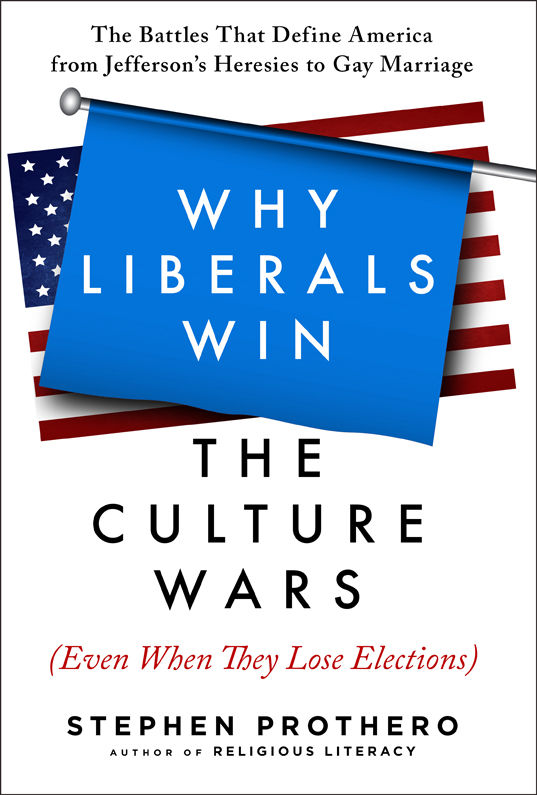
Why Liberals Win the Culture Wars (Even When They Lose Elections)
A History of the Religious Battles That Define America from Jefferson's Heresies to Gay Marriage Today
کتاب های مرتبط
- اطلاعات
- نقد و بررسی
- دیدگاه کاربران
نقد و بررسی

Starred review from November 9, 2015
Prothero (Religious Literacy), professor of religion at Boston University, does away with the idea that America’s culture wars are a recent phenomenon, showing how such battles have been waged since the nation’s founding and have molded the national character and traditions. Culture wars, Prothero writes, provoke change, serving as the catalyst for American democracy despite the nasty public disputes between conservatives and liberals over moral, religious, and social issues. Quoting conservative political pundit Pat Buchanan’s 1992 claim that a “ ‘cultural war’ was being waged ‘for the soul of America,’ ” Prothero assembles five pivotal events as supporting evidence: the gritty election of 1800, the antebellum anti-Catholic crusade, the mid-19th-century anti-Mormon campaign, Prohibition, and the ongoing culture skirmishes that began in the 1960s. The right has taken the fight to the left in the current era of partisan politics, but liberals have had their share of victories: school integration, prayer bans in schools, busing, voting rights, the Equal Rights Amendment for women, the Affordable Care Act (also known as Obamacare), and marriage equality. Prothero’s illuminating and absorbing take on America’s growing pains reveals that when “each of our cultural battles comes to an end, we are left with a more inclusive country.”

Starred review from October 15, 2015
Prothero (Religion/Boston Univ.; The American Bible: How Our Words Unite, Divide, and Define a Nation, 2012, etc.) gives hope to liberals who think conservatives are taking over. The author shows how today's hyperpartisanship is a byproduct of the culture wars. Conservatives disproportionately fire the first shot but often flame out. Prothero focuses on culture rather than race and on tolerance, inclusion, and pluralism. Still, the specters of the Civil War and slavery play a large part in culture wars, with sides still drawn along the North-South divide, and the author examines four particular conflicts in our history: the presidential election of 1800, anti-Catholicism, anti-Mormonism, and Prohibition. The fight between John Adams' Federalists and Thomas Jefferson's Republicans was just the beginning of the current rancor in politics. Anti-Catholicism began during the 1830s, with attackers using faith as a proxy for character. As slavery eased anti-Catholicism, it was the Mormons' turn, but Stephen Douglas argued against government interference in the "peculiar institutions" of the Mormons' polygamy and of the South's slavery. Then came the 18th Amendment and Prohibition; it was the first amendment to limit personal liberty and was happily repealed with the coming of the Depression. As Prothero shows, all of these conflicts were contests between homogeneity and diversity. Conservatives usually strive to preserve their way of life, while liberals cite the Bill of Rights and seek to progress. The cycle repeats itself: the right strikes, the left responds, there is accommodation, and liberals often win with a new consensus. As a way forward, the author counsels to "listen a little less to Rush Limbaugh and Bill Maher and a little more to Abraham Lincoln and John Kennedy, to realize that our cultural contests need not be life-or-death battles between patriots and traitors." Prothero brilliantly shows how the same groups drive conflicts year after year and often lose--and how the results eventually make us stronger. Useful, instructive reading for all voters in the upcoming election year.
COPYRIGHT(2015) Kirkus Reviews, ALL RIGHTS RESERVED.

December 1, 2015
With yet another presidential election just around the corner, America's culture wars are in full swing. Prothero (religion, Boston Univ.; God Is Not One; Religious Literacy) offers a timely social history that illustrates that the current conflicts are actually part of a much larger story that dates back at least to 1796. Using a series of episodes that include the religious beliefs of Thomas Jefferson, anti-Catholicism, anti-Mormonism, and Prohibition, then sweeping through some of the key skirmishes of the past 40 years, Prothero lays out an intriguing proposal. His thesis is that conservatives tend to instigate individual culture wars owing to anxiety that their world is passing away, and that liberals tend to win them, in large part because conservatives usually rally around lost causes. Eventually, the liberal side becomes the default American perspective, leading to an ever-more inclusive culture over time. The conservative side then moves on to the next grievance and the cycle begins again. Prothero demonstrates this pattern repeating itself in each of his chosen historical episodes. VERDICT This book provides social, political, and historical context to the current culture wars and offers constructive and hopeful ideas for defueling the cycle, ideas that are pertinent to liberals and conservatives alike.--Brian Sullivan, Alfred Univ. Lib., NY
Copyright 2015 Library Journal, LLC Used with permission.

























دیدگاه کاربران